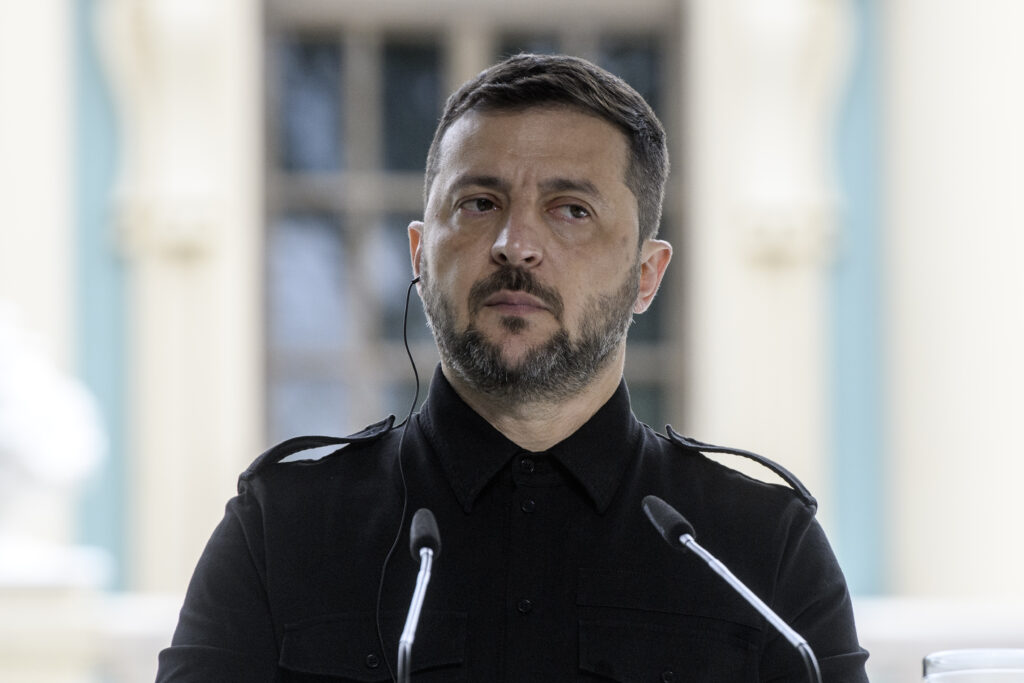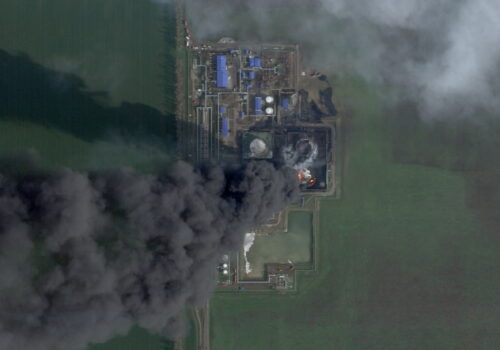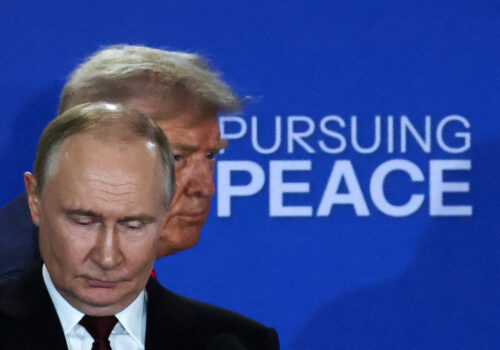As US-led efforts to end the war in Ukraine continue, Russian Foreign Minister Sergey Lavrov has indicated that the Kremlin does not recognize the legitimacy of Ukrainian President Volodymyr Zelenskyy and would not accept his signature on any peace deal. “When we come to a stage when you have to sign documents, we would need a very clear understanding by everybody that the person who is signing is legitimate,” Lavrov told NBC News in an August 24 interview. “And according to the Ukrainian constitution, Mr. Zelenskyy is not at the moment.”
This is not the first time Russia has expressed such doubts. Moscow has made attacking Zelenskyy’s legitimacy a centerpiece of its disinformation playbook, with Russian President Vladimir Putin also claiming earlier this year that the Ukrainian leader “has no right to sign anything” in potential peace talks.
The Kremlin’s goal is transparent. Russia seeks to fracture Ukrainian society, weaken Western support, and complicate future negotiations. But Moscow’s efforts to portray Zelenskyy as illegitimate fall apart when weighed against Ukraine’s Constitution and the country’s established political practice, along with international precedents and legal tradition.
Stay updated
As the world watches the Russian invasion of Ukraine unfold, UkraineAlert delivers the best Atlantic Council expert insight and analysis on Ukraine twice a week directly to your inbox.
Russia’s full-scale invasion in February 2022 led directly to the introduction of martial law in Ukraine, making it impossible for the country to hold scheduled presidential elections in 2024. The terms of martial law and the Ukrainian Election Code both explicitly prohibit any elections in the current wartime conditions.
A nationwide vote under bombardment is neither legal nor feasible. Millions of Ukrainians are currently displaced within Ukraine or abroad. Voter lists cannot be updated reliably. Soldiers serving in the combat zone and Ukrainian civilians who at constant risk of airstrikes cannot safely cast ballots. A wartime election would disenfranchise millions and jeopardize the legitimacy of the Ukrainian authorities rather than safeguarding it.
This reality is widely accepted. Ukrainian political parties, civil society, and the public agree that elections should only resume when they can be free, fair, inclusive, and safe. Polling shows that most Ukrainians oppose elections during wartime. International partners echo this consensus and reject suggestions that Zelenskyy lacks legitimacy. The European Commission has affirmed that it has “no doubts the president of Ukraine is Volodymyr Zelenskyy.”
Ukraine’s Constitution directly addresses this situation. Article 103 sets a five-year presidential term, but Article 108 clarifies that the president remains in office “until the assumption of office by the newly elected president.” Authority does not simply expire on a calendar date. Instead, it continues until a successor is duly sworn in.
Precedent supports this reading. No Ukrainian president has ever served exactly five years, with terms varying according to election and inauguration schedules. As one drafter of the 1996 Ukrainian Constitution explained in The Economist, “Zelenskyy continues in power for as long as martial law applies. There is no political or legal crisis. Full stop.”
Crucially, checks and balances remain. Every extension of martial law in Ukraine requires parliamentary approval, providing Ukrainian lawmakers with ample opportunity to raise objections. Ukraine’s Constitutional Court can also review the legality of presidential continuity if petitioned by members of parliament, the Supreme Court, or the Ombudsman. In other words, Zelenskyy’s current authority is rooted not in personal decree but in a functioning democratic system.
Eurasia Center events

Why does the Kremlin keep pushing this line? By branding Zelenskyy “unconstitutional,” Russia hopes to derail any future peace process and weaken Western unity. Unfortunately for Moscow, there are clear signs that this strategy is failing. Ukrainians overwhelmingly recognize Zelenskyy as their lawful president, while international leaders consistently affirm his legitimacy.
Far from undermining Kyiv, the Kremlin’s narrative underscores its desperation and highlights Moscow’s obvious reluctance to engage in meaningful peace talks. This approach also inadvertently draws attention to the serious legitimacy issues around Russia’s own elections, which routinely fall well short of recognized international standards.
International norms support Ukraine’s position on wartime elections. The Council of Europe has affirmed that postponing elections in exceptional situations, such as a state of war, may be necessary to preserve constitutional order and allow citizens to express their will in a safe context. History also offers precedent, with Britain postponing scheduled parliamentary elections during both world wars.
Ukraine is currently following the same logic. By upholding constitutional continuity, maintaining democratic safeguards, and preparing for the moment when elections can be held freely, the Ukrainian government is strengthening rather than weakening its legitimacy.
Zelenskyy remains president not despite the Ukrainian Constitution, but because it guarantees continuity in extraordinary times. And when peace comes, Ukraine will be ready to prove once again at the ballot box that its democracy endures. This is in stark contrast to Russia, where an illegitimate ruler has remained in office for decades due to unconstitutional charades and manipulated elections.
Serhii Savelii is an independent Ukrainian election analyst.
Further reading
The views expressed in UkraineAlert are solely those of the authors and do not necessarily reflect the views of the Atlantic Council, its staff, or its supporters.

The Eurasia Center’s mission is to enhance transatlantic cooperation in promoting stability, democratic values, and prosperity in Eurasia, from Eastern Europe and Turkey in the West to the Caucasus, Russia, and Central Asia in the East.
Follow us on social media
and support our work
Image: Ukrainian President Volodymyr Zelenskyy attends a joint press conference with Canadian Prime Minister Mark Carney in Kyiv, Ukraine, on August 24, 2025, on Ukraine's Independence Day. (Photo by Maxym Marusenko/NurPhoto)




